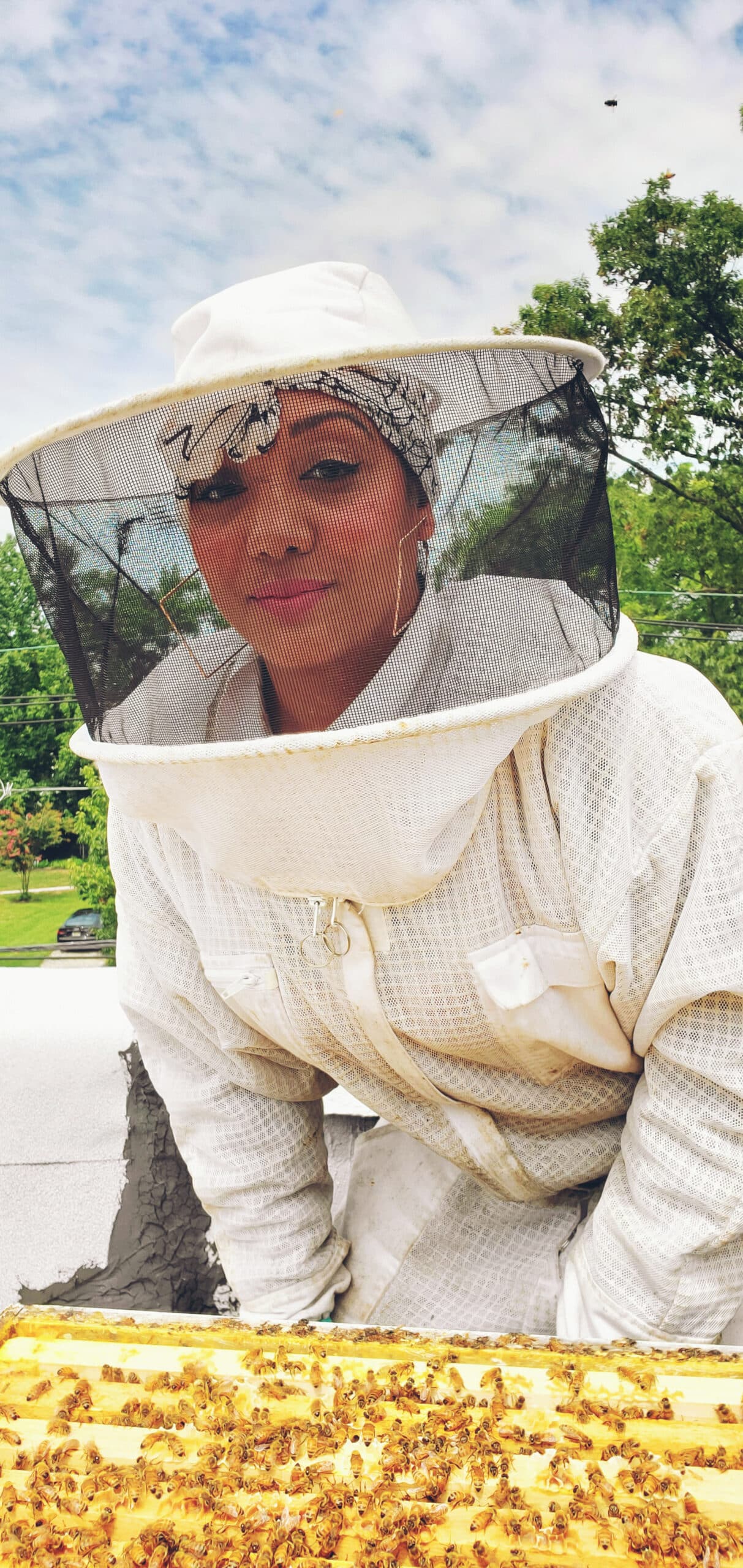At 36 She Made A Career Move, Now Afro-Boricua Nicole Rivera Hartery Is Changing The Face Of Beekeeping
Beekeeping isn’t a popular career choice. Most people, if they’re being honest, aren’t quite sure what the post even entails. But they do have an idea of what an apiarist looks like: Typically, they’re a middle-aged white man in an all-white, ventilated suit. In Philadelphia, Nicole Rivera Hartery, a Black Puerto Rican beekeeper, is shattering this stereotype – and through education and representation, she’s hoping to help change the face of the industry.
Before the Covid-19 pandemic, Rivera Hartery spent much of her workdays in school classrooms, teaching little ones about the science of apiary and why caring for bees is critical to our environment. While sparking children’s interest in her vocation, her talks also aim to show youth of color, in particular, that they have a place and history in this field as well.

Nicole Rivera Hartery
“Dealing with kids, beekeeping is brand new to them. They’re not questioning that it’s an Afro-Latina doing this or that it’s a girl. Those questions come from older people who already have an idea about what a typical beekeeper is and looks like. So, for me, this helps normalize beekeeping in our community. It shows them that they, their moms or their sisters could be doing this job,” Rivera Hartery, 38, tells FIERCE.
The invisibility of beekeepers of color is, in part, why the mother-of-two entered the field in her mid-30s. Growing up, Rivera Hartery was always fascinated by animals and insects. She remembers devouring children’s zoology magazines, playing with critters outdoors and envisioning a career in marine biology. By the time high school graduation came around, her interests had shifted, and she instead studied fashion. Realizing afterwards that she lacked the passion for personal wardrobe styling needed to drive her hustle in the competitive business, she eventually entered the mortgage industry. But more than a decade into Rivera Hartery’s career, she realized this gig didn’t invigorate her life, either. In fact, the only jobs that filled her with fervor were those she dreamed about as a child, those involving living creatures.
During a visit to a Philadelphia museum, Rivera Hartery entered an observatory honey bee hive and was captivated by what she saw and heard.

In the days that followed, she watched documentaries and read literature about the buzzy insects. She realized this was something she was passionate about and soon enrolled in a beekeeping course at Rutgers University.
At 36, she left her former job and became a beekeeper.
“I was just blown away by everything I was learning, by how democratic they are in their own societies,” Rivera Hartery says.
Beekeeping is a laborious job. Throughout the week, Rivera Hartery cares for two hives on her roof and another at a local animal hospital. In addition to providing honey bees with hives, she has to regularly inspect them, going box by box and frame by frame to make sure the bees have no health problems, treat them if they do and to ensure that the queen is laying enough eggs and that there is adequate space for the colonies. When hives carry too much honey, for instance, the bees lack room to move around and risk swarming. To avoid this, Rivera Hartery removes excess honey and sells it through her shop Bees on Main St.
Helping bees take care of themselves is an increasingly important job. According to the United Nations, pollinators, like bees, are under growing threat as a result of climate change and human impact. The loss of bees is dangerous for our environment. These insects pollinate a third of the food that people eat, including many nuts, fruits and vegetables. Even more, as pollinators, bees support the growth of trees, flowers and other plants, which contributes to interconnected ecosystems that enable different species to coexist.
According to Rivera Hartery, humans can learn a lot from the social insects.

Bees live in large colonies that include a single adult queen bee, who lays eggs, and tens of thousands of female worker bees. Male honey bees, known as drones, appear during the spring mating season. In the two years she has been a beekeeper, the Afro-Latina has gained insight from the critters – who understand they are healthier when they work together – about belonging, democracy and feminism.
“It’s created more of a feminist in me. You see all these worker bees are women. Male bees are important; don’t get me wrong, they are crucial to mate with queens and continue life. But the functioning of the colonies is all due to women. Women are the warriors,” Rivera Hartery says. “Among the human race, this is true, too. We run our homes and we have careers, yet we have been taught that we are weaker. I don’t know where this idea came from, but, if you look at nature, it’s clear that it’s women who run things.”
Beekeeping has been rewarding to Rivera Hartery in more intimate ways as well. While women of color are underrepresented in the field, she has found other Black, Latina and Asian women in apiary through social media and has built new friendships based on shared passions and struggles. Even more, when life gets difficult, the beekeeper finds that caring for honey bees offers her a peace of mind she doesn’t necessarily gain through traditional wellness practices. She trusts it’s because she is doing work she’s supposed to be doing, one that doesn’t just bring her joy but that is also rooted in her ancestral history.
“Boricuas, Black people and people of Indigenous descent, this is our history. Our families lived off the land. Our grandparents and great-grandparents, many generations ago, did this on the island. We bond with the land and we bond with nature, so our perspectives are extremely important to agriculture and science,” Rivera Hartery says.




